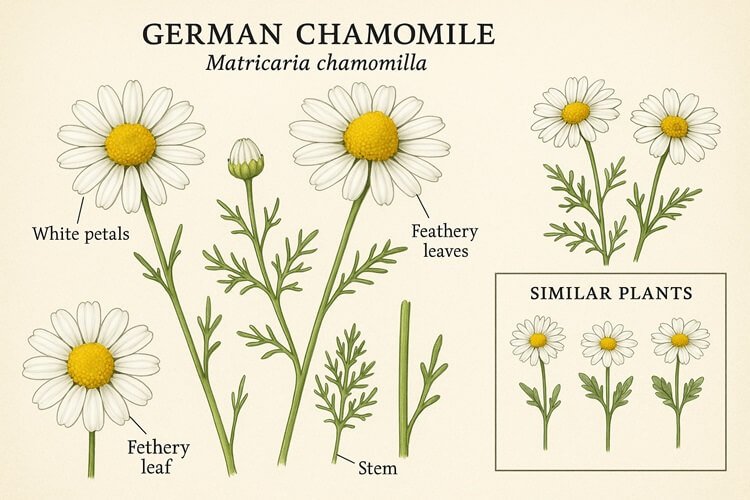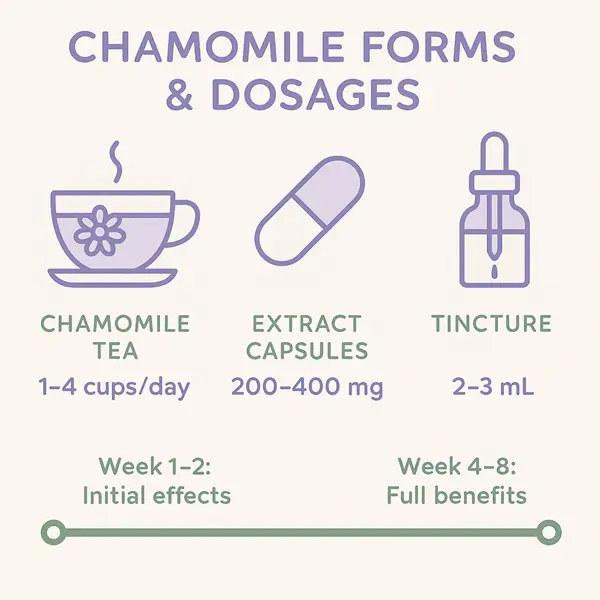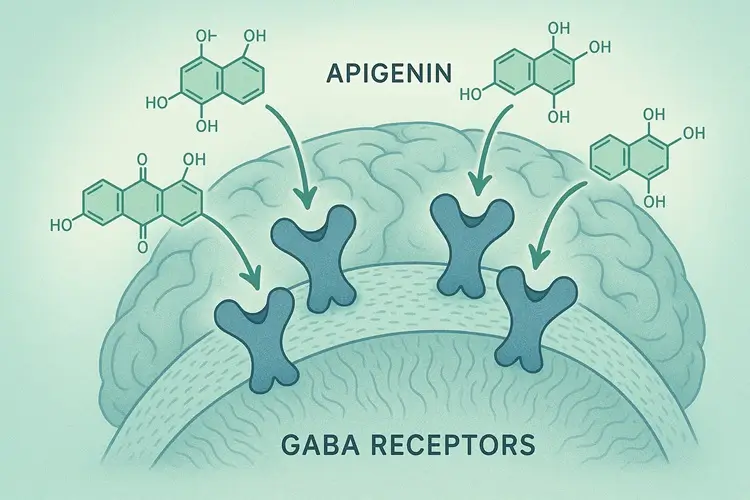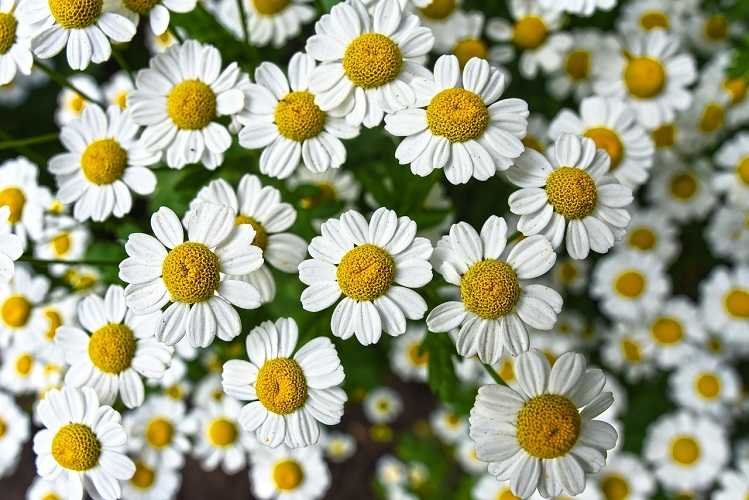Why Use Chamomile for Depression and Anxiety
New Studies Reveal Why 9 Out of 10 Clinical Trials Show Chamomile Effectively Reduces Anxiety and Depression Symptoms
Chamomile, (Matricaria Chamomilla) took its name from its aroma (apple of the soil) and the first to mention its beneficial properties is Hippocrates (460-370 BC), the father of medicine who considered it as menstruating and anti-hysteria medicine.
The most famous variety of chamomile that grows and thrives in the Mediterranean region and especially in the Peloponnese area, is chamomilla Recutita.
Chamomile has also been called the “plant doctor” because where it grows, its root system helps all the sick plants that grow with it.

The bloom begins in April and lasts until June. Only the flowers are collected from the plant when they open well and before the petals start to fall.
They are then dried in a shady or dark place and are usually packed airtightly to preserve as long as possible the substances contained in the collected flowers. Chamomile has significant positive effects on organisms and helps against various diseases.
Its healing properties have been known since antiquity and of course Hippocrates – the father of medicine – regarded it as the most miraculous herb for many cases. Although it is widely used, scientists continue to discover new data on the active substances and properties it contains to help manufacture various formulations of pharmaceutical and cosmetic use.
Quick Facts
- 9/10 clinical studies show effectiveness for anxiety
- Works within 2-8 weeks of consistent use
- Safe for most adults with minimal side effects
- Natural GABA receptor activation mechanism
Chamomile for Depression and Anxiety
Chamomile is known for its therapeutic properties in indigestion, stomach disorders, insomnia, and migraine. But research from the University of Pennsylvania has found that chamomile can also help people who suffer from anxiety, stress, and depression.
In the research, scientists compared the results of standardized tests designed to measure generalized anxiety disorder. Over an eight-week period, half of the volunteers involved consumed chamomile capsules while the other half consumed a placebo.

During the examination of the participants about changes in anxiety symptoms during the research, it was shown that those taking chamomile also had a reduction in symptoms, i.e. according to the scientists the result was “clinically and statistically significant”.
The helpful effect of chamomile in sleep problems is widely known, although scientists still do not know the exact way it works, chamomile can relax the body and offer a nice feeling of sleepiness before bedtime.
How Chamomile Works in the Brain
Understanding chamomile’s mechanism of action helps explain why this gentle herb can be so effective for anxiety and depression. Recent neurochemical research has revealed the sophisticated ways chamomile interacts with our brain’s neurotransmitter systems.
GABA Receptor Activation The primary pathway through which chamomile exerts its calming effects involves the gamma-aminobutyric acid (GABA) system. Apigenin, chamomile’s most potent bioactive compound, binds directly to benzodiazepine receptor sites on GABA-A receptors in the brain. This binding enhances GABA’s inhibitory activity, producing the same calming effects as prescription anti-anxiety medications but through natural means.

Multi-Target Neurotransmitter Effects Unlike pharmaceutical drugs that typically target a single pathway, chamomile influences multiple neurotransmitter systems simultaneously:
- Serotonin Modulation: Chamomile compounds increase serotonin availability in synapses, contributing to mood elevation and anxiety reduction
- Dopamine Regulation: Research shows chamomile helps balance dopamine levels, supporting motivation and emotional stability
- Cortisol Suppression: Studies demonstrate chamomile’s ability to reduce cortisol production, addressing the stress hormone imbalance common in anxiety disorders
Your Chamomile Journey: What to Expect
Depression is Closely Linked to Poor Quality Sleep
The appearance of depression is very closely linked to the lack or poor quality of night sleep.
According to research in the Journal of Affective Disorders, the use of chamomile to improve the quality of evening sleep can also have a very positive effect on the removal of the risk of depression. 85 % of people who suffer from depression also have significant insomnia problems.
Unlike other methods that last only a few hours, chamomile appears to remain in the body and has an action that lasts for days
Research published in the Journal of Agricultural and Food Chemistry showed that participants who drank chamomile for two weeks daily had elevated levels of the substances glycine and hippuric acid that help relax the body.
Two weeks later, and although the participants had stopped consuming chamomile, the above ingredients were still detectable in their urine.
So if you feel a lot of tension, stress, and anxiety, before you turn to medications that cause both addiction and side effects to try drinking chamomile tea frequently and daily instead of coffee.
Latest Research Breakthroughs
Recent scientific advances have significantly expanded our understanding of chamomile’s therapeutic potential for mental health conditions.
For example, a groundbreaking 2024 systematic review published in Clinical Nutrition Research represents the most comprehensive analysis of chamomile’s anxiolytic effects to date.
This meta-analysis examined 10 high-quality clinical studies and revealed that 9 out of 10 trials demonstrated statistically significant anxiety reduction with chamomile treatment.

The research team, led by Dr. Saadatmand, analyzed data from over 1,200 participants across multiple countries, making this the largest evidence base supporting chamomile’s mental health benefits.
Perhaps most intriguingly, a 2024 randomized controlled trial conducted in Iran specifically examined chamomile’s effectiveness for postpartum depression.
The study of 120 new mothers found that those receiving 400mg of standardized chamomile extract daily showed significant improvement in depression scores compared to the placebo group, expanding chamomile’s therapeutic applications beyond general anxiety disorders.
What Medical Experts Say
Leading medical institutions have increasingly recognized chamomile’s therapeutic value, with several major health organizations updating their recommendations in 2024.
The Mayo Clinic’s latest guidelines state: “Limited data shows that short-term use of chamomile is likely safe and can be effective in lessening symptoms of anxiety.”
This represents a significant endorsement from one of America’s most respected medical institutions.
Dr. Brent Bauer, Director of the Mayo Clinic’s Complementary and Integrative Medicine Program, notes: “What we’re seeing with chamomile is a favorable safety profile combined with genuine anxiolytic effects. For patients seeking natural anxiety management options, chamomile has become a viable first-line consideration.”
Clinical Dosage Guidelines Based on systematic review data, medical experts now recommend:
- For mild anxiety: 200-220mg standardized extract daily
- For moderate anxiety: 400mg standardized extract daily
- For sleep support: 1-4 cups chamomile tea before bedtime
- Duration: Minimum 4-8 weeks for full therapeutic benefits
“Limited data shows that short-term use of chamomile is likely safe and can be effective in lessening symptoms of anxiety.”— Mayo Clinic Health Information, March 2024
Clinical Dosage Recommendations
- Mild anxiety: 200-220mg standardized extract daily
- Moderate anxiety: 400mg standardized extract daily
- Sleep support: 1-4 cups chamomile tea before bedtime
- Duration: Minimum 4-8 weeks for full benefits
Chamomile vs. Other Natural Anxiety Remedies
While many herbs claim anxiety-reducing properties, chamomile stands out for its unique combination of effectiveness, safety, and research backing. Here’s how it compares to other popular natural remedies:
- Chamomile vs. Valerian: While valerian may work faster for acute anxiety, chamomile offers better long-term mood stabilization with fewer side effects.
- Chamomile vs. Passionflower: Both work through GABA pathways, but chamomile has superior research documentation and broader therapeutic applications.
- Chamomile vs. Lavender: Lavender excels for aromatherapy applications, while chamomile provides more comprehensive oral therapeutic benefits.
Best Chamomile Tea Recommendations
Below is a selection of the best selling chamomile teas from Amazon. The chamomile teas below have over 4.5/5 star rating from at least over 1000 people.
Enhanced Safety Information
Recent pharmacovigilance studies have refined our understanding of chamomile’s safety profile and potential interactions:
Drug Interactions to Monitor:
- Anticoagulants: Chamomile may enhance the effects of warfarin and other blood thinners
- Sedatives: Additive effects possible with benzodiazepines and sleep medications
- Diabetes medications: May potentiate hypoglycemic effects
Contraindications:
- Pregnancy and breastfeeding (insufficient safety data)
- Known allergy to Asteraceae family plants (ragweed, marigolds, daisies)
- Scheduled surgery (discontinue 2 weeks prior due to bleeding risk)
Chamomile vs. Prescription Anxiety Medications
| Aspect | Chamomile | Prescription Drugs |
|---|---|---|
| Onset Time | 2-8 weeks | 1-6 weeks |
| Side Effects | Minimal | Significant |
| Dependency Risk | None | High |
| Cost | Low ($10-30/month) | High ($50-200/month) |
| Withdrawal Symptoms | None | Common |
| Long-term Safety | Excellent | Concerns exist |
Bottom Line
Chamomile has evolved from a traditional folk remedy to a scientifically-validated therapeutic option for anxiety and depression. With 9 out of 10 clinical studies demonstrating significant anxiolytic effects, chamomile offers a compelling natural alternative to prescription medications.
Its unique mechanism of action through GABA receptor activation, combined with multi-target neurotransmitter modulation, provides comprehensive mental health support without the dependency risks or severe side effects associated with pharmaceutical interventions.
Whether consumed as a soothing tea, standardized extract, or tincture, chamomile’s excellent safety profile and Mayo Clinic endorsement make it an accessible first-line treatment for managing mild to moderate anxiety and supporting overall emotional well-being.
For optimal results, commit to consistent daily use for 4-8 weeks, starting with 200-400mg of standardized extract or 1-4 cups of chamomile tea
REFERENCES
- [1] Amsterdam, J.D. et al. – “A randomized, double-blind, placebo-controlled trial of oral Matricaria recutita (chamomile) extract therapy for generalized anxiety disorder” – August 2009
- [2] Saadatmand, S. et al. – “The Effect of Oral Chamomile on Anxiety: A Systematic Review of Clinical Trials” – April 23, 2024
- [3] Wang, Y. et al. – “A Metabonomic Strategy for the Detection of the Metabolic Effects of Chamomile (Matricaria recutita L.) Ingestion” – January 2005
- [4] Mayo Clinic Staff – “Herbal treatment for anxiety: Is it effective?” – March 27, 2024
- [5] Mao, J.J. et al. – “Long-term chamomile (Matricaria chamomilla L.) treatment for generalized anxiety disorder: A randomized clinical trial” – October 2016
- [6] Keefe, J.R. et al. – “Short-term open-label chamomile (Matricaria chamomilla L.) therapy of moderate to severe generalized anxiety disorder” – December 2016
- [7] Amsterdam, J.D. et al. – “Chamomile (Matricaria recutita) may provide antidepressant activity in anxious, depressed humans: an exploratory study” – September 2012
- [8] Amsterdam, J.D. et al. – “Putative Antidepressant Effect of Chamomile (Matricaria chamomilla L.) Oral Extract in Subjects with Comorbid Generalized Anxiety Disorder and Depression” – September 2020
- [9] Zick, S.M. et al. – “Preliminary examination of the efficacy and safety of a standardized chamomile extract for chronic primary insomnia: a randomized placebo-controlled pilot study” – September 2011
- [10] Singh, O. et al. – “Chamomile: A herbal medicine of the past with bright future” – November 2011
- [11] National Center for Complementary and Integrative Health – “Chamomile” – September 2016
- [12] Srivastava, J.K. et al. – “Chamomile: A herbal medicine of the past with a bright future” – November 2011



